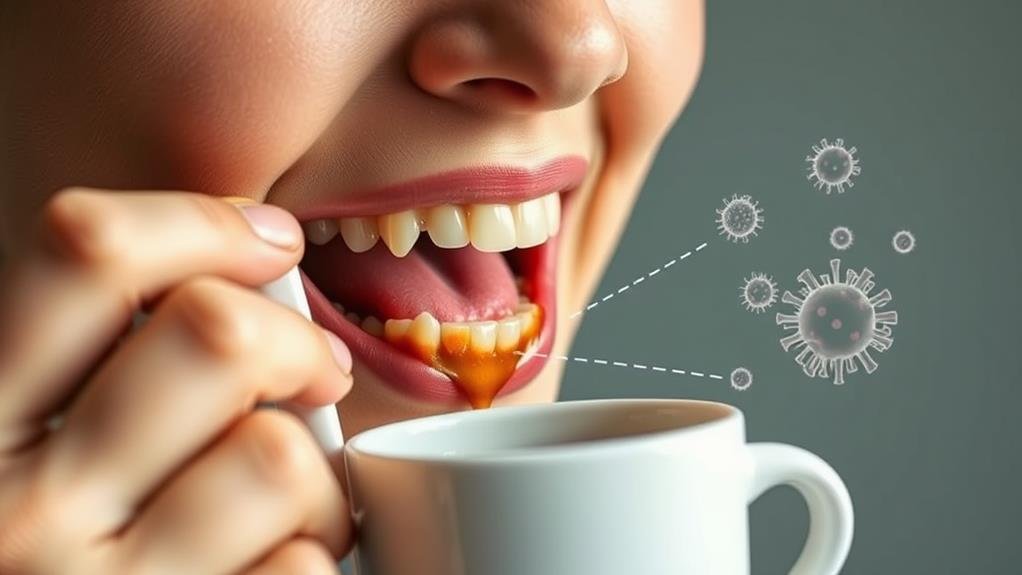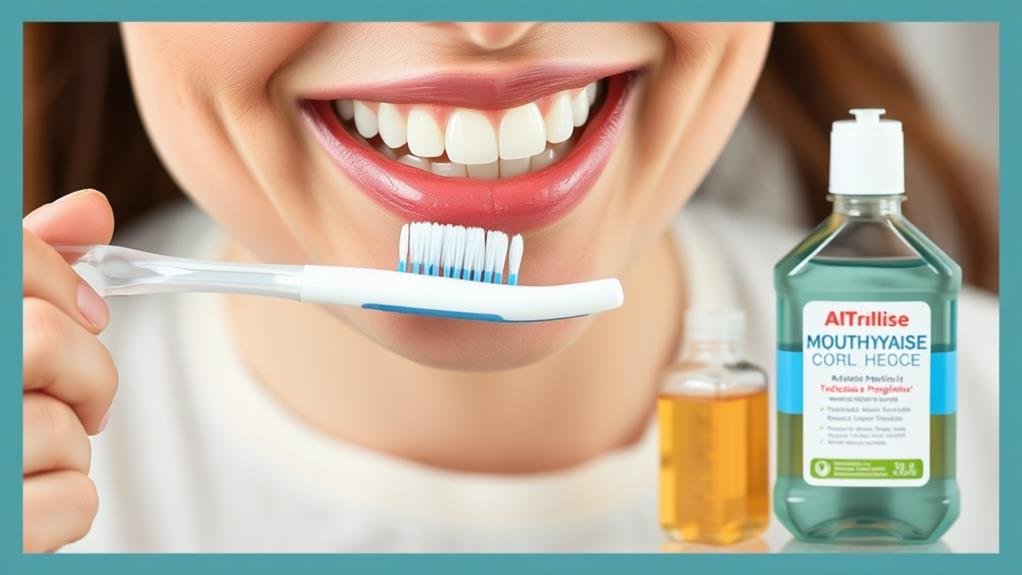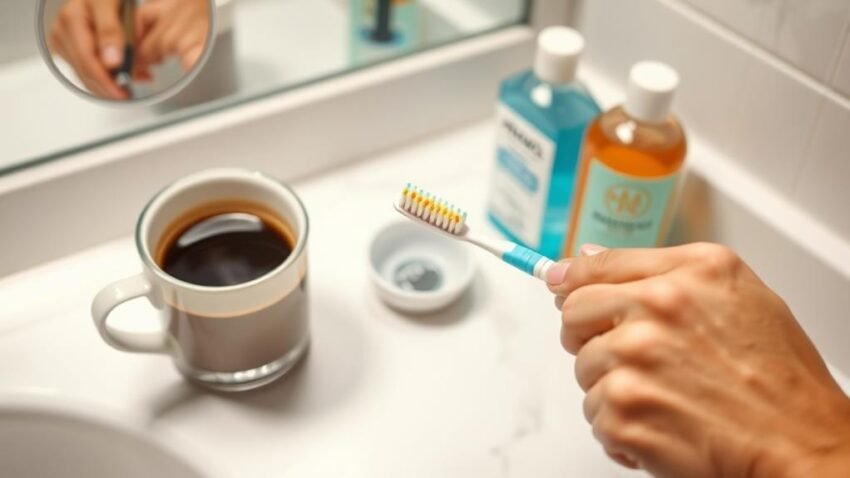As someone who enjoys a good cup of coffee, I'm sure you've encountered the pesky issue of coffee breath at some point. The sulfur compounds and acidic residues in coffee can leave your mouth feeling stale and smelling less than fresh. But don't worry, there are simple yet effective ways to tackle this problem. From brushing your teeth shortly after your morning brew to using sugar-free breath mints, there are several strategies that can help you keep your breath fresh throughout the day. Let's explore these tips together and find out how you can enjoy your coffee without the lingering aftertaste.
Causes of Coffee Breath

When you sip on a steaming cup of coffee, the aroma and taste can be invigorating, but the aftermath might not be as pleasant. Coffee breath is a common issue many of us face, and understanding its causes is the first step to overcoming it. One major reason for coffee breath is the sulfur-containing aroma compounds produced during the roasting process. These compounds contribute to that characteristic smell, often compared to a rotten egg odor. Additionally, coffee's acidic nature disrupts the natural pH balance in your mouth, creating an environment that promotes bacterial growth and leads to bad breath. The unique flavor profile of Arabica coffee, influenced by its diverse lineages and growing conditions, can also play a role in the complexity of the breath it leaves behind, as certain varieties may have stronger aromatic compounds Arabica coffee's flavor profile.
Caffeine, particularly the tannins found in coffee, plays another role by reducing saliva production, resulting in dry mouth. Saliva helps neutralize acids and wash away bacteria, so when it's scarce, these issues intensify. Besides, additives like milk, cream, and sugar can foster bacterial overgrowth on your teeth and tongue, worsening the problem. Understanding these factors will help you take steps to mitigate coffee breath effectively. By addressing each cause, you can enjoy your coffee without worrying about its lingering effects.
Tips to Combat Coffee Breath
To combat coffee breath effectively, start by integrating a few simple habits into your daily routine. One of the most direct methods is brushing your teeth within 30 minutes of consuming coffee. This helps eliminate any lingering coffee particles that can contribute to bad breath. Additionally, maintaining your coffee maker regularly can help guarantee that the coffee's taste remains pleasant, which can also positively influence your breath maintains coffee maker performance.
In addition to brushing, maintaining good oral hygiene habits is essential. Using sugar-free breath mints, gum, or cough drops can mask coffee breath temporarily. These products stimulate saliva production, which helps rinse away bacteria and neutralize odors.
If you prefer more natural remedies, chewing on fresh parsley can be quite effective. The chlorophyll in parsley is known to neutralize odors, making it a great alternative to traditional mints. Drinking plenty of water also helps keep your mouth moist, preventing dry mouth—a common cause of bad breath.
Gargling with mouthwash post-coffee consumption can further freshen your breath by eliminating bacteria that may have accumulated. Lastly, opting for black coffee with no sugar additives reduces bacterial growth and minimizes the likelihood of coffee breath. By integrating these tips into your routine, you can notably reduce the impact of coffee on your breath and maintain good oral health.
Preventing Coffee Breath

Before you take your first sip of coffee, there are several steps you can take to prevent coffee breath from happening in the first place. One effective way is to drink black coffee without any additives. This reduces the growth of bacteria in your mouth, which can contribute to bad breath. If you prefer a bit of flavor, opt for sugar substitutes or natural flavorings like cinnamon instead of regular sugar. These alternatives minimize the buildup of sugary residues that bacteria thrive on.
Another strategy is to choose whole milk over skim milk when adding dairy to your coffee. Whole milk contains less sugar than skim milk, which means it's less likely to promote bacterial growth and subsequent bad breath. Maintaining good oral hygiene habits is also vital; brushing your teeth after consuming coffee helps remove any residual coffee particles and keeps your mouth clean.
Staying hydrated by drinking water throughout the day is another key measure. Water helps wash away coffee residue and keeps your mouth fresh, supporting overall oral health. By following these simple tips, you can notably reduce the likelihood of experiencing coffee breath and maintain better oral health.
Alternatives to Coffee
If you're finding it hard to manage coffee breath despite your best efforts, it might be time to explore some alternatives to coffee. One option is high-caffeine black tea or chai tea. These beverages can provide a morning boost similar to coffee but may have a different impact on your breath. Another alternative is caffeine-free chicory root coffee, which offers a coffee-like experience without the caffeine and potentially fewer sulfuric and acidic compounds that can affect breath.
Yerba mate is another herbal tea that contains caffeine and can be a suitable substitute for coffee. These alternatives not only help in managing coffee breath but also cater to different taste preferences. Adjusting your beverage choice can make a significant difference in reducing the sulfuric and acidic compounds that often lead to coffee breath.
Experimenting with these options will help you find what works best for you. Whether it's the rich flavor of black tea, the earthy taste of chicory root, or the slightly bitter yet invigorating experience of yerba mate, there's likely an alternative that will meet your needs while helping to mitigate coffee breath. By trying out these alternatives, you can enjoy your morning boost without the negative impact on your breath.
Importance of Oral Hygiene

Good oral hygiene is your best ally in the battle against coffee breath. When you drink coffee, it leaves behind residue and particles that can contribute to bad breath. Regular brushing and flossing after consuming coffee can substantially reduce this issue by removing these remnants from your teeth and gums. This prevents bacterial overgrowth, which is a primary cause of coffee breath.
Using mouthwash with antibacterial properties is another effective way to combat coffee breath. These mouthwashes help kill odor-causing bacteria, leaving your mouth fresh and clean. Additionally, chewing sugar-free gum stimulates saliva production, which helps wash away bacteria and neutralize odors naturally.
Maintaining a clean tongue is also essential. Bacteria often accumulate on the surface of your tongue, contributing to bad breath. Using a tongue scraper can effectively remove these bacteria, ensuring that your tongue remains clean and free from odor-causing microbes. By incorporating these simple oral hygiene practices into your daily routine, you can significantly reduce the occurrence of coffee breath and maintain a fresher, healthier mouth. Remember, good oral hygiene is key to managing coffee breath effectively.
Consulting Your Dentist
If you're struggling with persistent coffee breath, consulting your dentist is a smart move. They can provide dental health advice tailored to your specific needs and conduct oral health check-ups to identify any underlying issues. Your dentist might also recommend specific oral hygiene practices or products to help you manage and eliminate coffee breath effectively.
Dental Health Advice
When it comes to getting rid of coffee breath, consulting your dentist is one of the most effective steps you can take. Bad breath, or halitosis, can be caused by various factors, and coffee is just one of them. However, underlying oral health issues often contribute to persistent bad breath.
Dental health advice from a professional can be highly beneficial. Here are some key points to keep in mind:
- Personalized Hygiene Practices: Your dentist can recommend specific oral hygiene practices tailored to your needs, which may include special brushing and flossing techniques.
- Addressing Underlying Issues: Regular dental check-ups can help identify and address underlying oral health issues that contribute to bad breath.
- Targeted Products: Dentists may suggest products like special toothpaste or mouthwash designed to target the causes of coffee breath and other forms of halitosis.
Oral Health Check-ups
Regular oral health check-ups with your dentist are important for addressing coffee breath and maintaining overall oral hygiene. These visits allow your dentist to identify any underlying issues that might be adding to bad breath. Here's why consulting your dentist is vital:
Why Oral Health Check-ups Matter
| Reason | Benefit | Impact |
|---|---|---|
| Identify Issues | Dentists can pinpoint causes of bad breath | Addresses root cause, not just symptoms |
| Personalized Plans | Tailored treatment plans based on your needs | Effective management and prevention |
| Professional Cleanings | Regular cleanings help prevent and manage bad breath | Maintains fresh breath, healthy teeth and gums |
| Prompt Addressing | Ensures any oral health issues are promptly handled | Prevents long-term problems, promotes overall health |
During these check-ups, your dentist can offer specific recommendations and solutions to combat coffee breath. They may suggest adjustments to your dental care routine, provide tips on how to manage coffee consumption, or recommend products that can help maintain fresh breath. By regularly visiting your dentist, you can make sure that any oral health issues contributing to bad breath are promptly addressed, keeping your mouth healthy and your breath fresh.
Specific Recommendations
After ensuring your oral health with regular check-ups, it's time to focus on specific recommendations from your dentist to tackle coffee breath. Consulting your dentist can provide personalized advice tailored to your needs, helping you address underlying issues that might be contributing to bad breath.
Here are some ways your dentist can help:
- Identify Underlying Issues: Your dentist can identify any oral health problems that may be causing bad breath. This could include gum disease, cavities, or other conditions that need attention.
- Recommend Products: Your dentist can suggest specific products such as toothpaste, mouthwash, or chewing gum that are designed to combat coffee breath effectively.
- Long-Term Solutions: By seeking professional advice, you can find long-term solutions for bad breath rather than temporary fixes.
Conclusion
Combating coffee breath is a multifaceted battle, but with the right strategies, you can emerge victorious. By maintaining good oral hygiene, using sugar-free mints or gum, and staying hydrated, you can keep your breath fresh. Remember, brushing your teeth within 30 minutes of sipping coffee is like hitting the nail on the head—it directly targets the problem. Stay consistent and you'll find that coffee breath becomes a distant memory.

